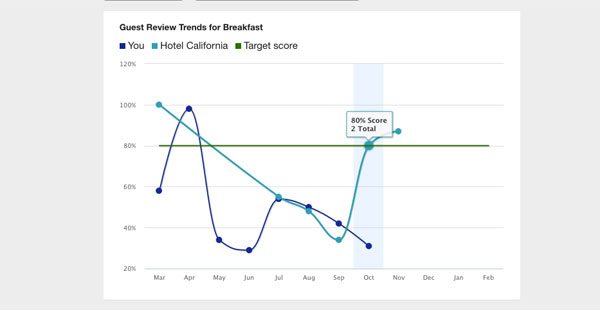Expedia Has a New Tool to Help Hoteliers Use Reviews to Improve Service

Skift Take
It sounds like a test question that you might be asked when were 16 years old and in school: Eighty hotel guests say the free breakfast is "fine," nine say it's "awful," one says it's "awesome," and 14 say it's "something else." What are the guests, on average, trying to tell the hotel manager about the breakfast?
To handle questions like that, Expedia debuted this winter a tool that points hotel managers toward the right steps to take to improve guests’ assessments — and their hotels’ ratings.
Called Guest Review Insights, the tool has just debuted in Expedia Partner Central, the company's extranet for hoteliers, which aggregates English-language reviews across all Expedia, Inc. brands for the past year.
The move is part of an Expedia effort since 2015 to help hoteliers respond to the millions of verified hotel reviews from guests who have booked a stay through the online travel agency.
Many hotel managers have a hard time figuring out what guests are trying to say in their reviews, which are sometimes unclear. They also have trouble noticing patterns, like an uptick in complaints about a particular service, because they only read reviews one-by-one over a long period of time.
The tool helps with that, summarizing guest opinions by amenity and "attribute", such as breakfast, customer service, gym, and cleanliness.
The tool uses sentiment analysis, a method of sussing out the feelings and preferences underlying the words someone wrote. By treating the words as data, tabulating them, and integrating them with millions of similar findings, this process can detect patterns that allow for predictions.
In short, the computer will strongly suggest that the hotel needs to, say, improve the quality of the breakfast coffee.
The concept behind the tool isn't news. Guest engagement companies like ReviewPro, Czar Metrics, Brandify, Fishbowl Analytics, Hoxell, ReviewTrackers, and other companies have offered some versions of it for a while to hotels, on the theory that hotel ratings do not tell the full story of how guests view a property.
As of today, Expedia's tool only analyzes reviews in the English language. The initial launch is in the U.S., but it will expand to all hotels sharing the analysis of the English language reviews for those hotels.
The tool provides a score based on the feeling the traveler is expressing in the text. In general, Expedia does let travelers give ratings for different aspects of their stay, for example giving a 0-5 rating on room cleanliness, service and staff, room comfort, and hotel condition. Those ratings aren't included in the sentiment analysis.
In practice, hotels can compare these scores against the data that comes through in the sentiment analysis to see how people express these scores in the actual text, so they can derive more value from the data.
Hotels can do a competitive comparison of how their hotel is stacking up against up to 20 competitors of their choosing - comparing against competitors one-by-one.
So where is this all heading?
For a clue, we asked TrustYou, a Munich-based startup, is among the guest engagement technology providers that have used the technology. Its chief technology officer says that his team is looking beyond sentiment detection to invest a lot in text generation. In other words, software may create Zagat-style summaries for hotels based on guest reviews.
You can bet Expedia's engineers will do similar tests. Software-generated hotel summaries might more accurately describe hotels than ones written by individual persons.






